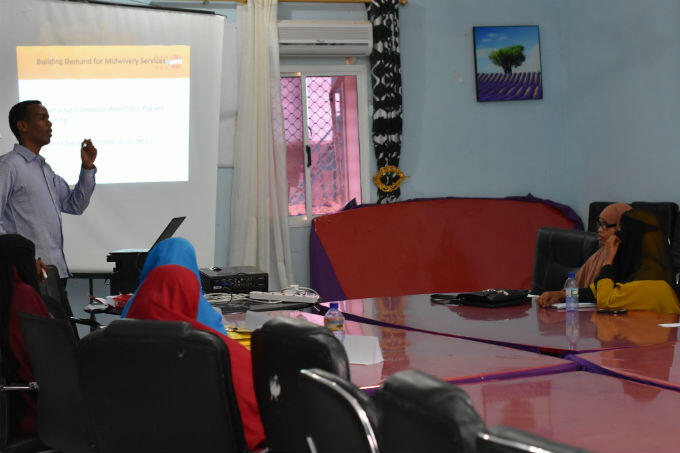A group of midwives working in rural areas in Puntland, Somalia will be receiving incentives for going the extra mile in reaching out to the vulnerable and the hard-to-reach populations with reproductive health and maternal services. The performance-based incentives pilot project for the midwives is being funded by the Government of Japan and managed by the Ministry of Health in Puntland with technical support from UNFPA Somalia.
The maternal mortality rate for Somalia is among the highest in the world with 12 women dying everyday due to pregnancy related causes, according to UNFPA Somalia International Midwifery Specialist Emily Denness.
“There are many factors which contribute to maternal deaths in Somalia but the key factor is the lack of births attended by a midwife or doctor,” said Denness, adding: “there is therefore great need to ensure that midwives are encouraged to reach out to women who need reproductive health and maternal services more in the hard-to-reach areas.”
In Somalia, over two decades of conflict have displaced approximately 20 per cent of the population and wreaked havoc on the nation’s infrastructure, and, as of 2010, nearly 80 per cent of the population lacked access to basic health services. Many internally displaced persons lack access to quality health care, including access to skilled health personnel such as midwives.
“Midwives have been recognised as having most of the life-saving skills essential for childbearing women, and are trained to recognise and promptly refer cases that need further assistance. The performance-based financing of midwifery services will incentivise midwives to reach out and promote midwifery and the services that they can give. This system is also moving towards being more compatible with future funding mechanisms, both public and private,” explained Denness.
The Ministry of Health in Puntland and UNFPA Somalia has just finalised an orientation workshop in Garowe, Puntland, on the performance based financing of midwifery services. Midwives who underwent the orientation were selected to be based in health centres across Puntland in Bosaso, Carmo, Galkacio, Galdogob, Garowe, Dhahar, Burtinle and Bocame and in areas where no midwives are present, or where the service would otherwise have closed without this valuable, life-saving support.
Some midwives are being placed in facilities that had no midwife at all. Due to funding shortages, some midwives are leaving their posts to find paid work.
“All of the midwives invloved in the project were previously trained in UNFPA-supported midwifery schools, meeting the Ministry of Health recognised standards and international level competencies of midwifery training,” said Denness.
An orientation was held for 10 midwives in Garowe, linking them together, receiving updates and refresher trainings on obstetric emergency scenarios and evidence-based care. They also received sessions on behaviour change communication to enhance health promotion and positive service provision, professional ethics, human rights in childbirth and respectful midwifery care. The midwives were also oriented on the incentive system. Their targets were set according to the local population numbers and are targets for the number of women they see for antenatal care, postnatal care, birth spacing and the births they assist.
According to Denness, the data the midwives provide to the Ministry of Health will be analysed, assessing what difference the performance based financing has made. “The midwives will be rewarded financially when they meet their targets, giving them additional motivation to promote the uptake of their services on a regular basis, reaching out to communities to show them the importance of seeing a midwife,” she said.
All the midwives under the project are now stationed in their health facilities. The Ministry of Health and UNFPA will be ensuring that the midwives have what they need to enable them to use their life-saving skills in their local communities.
-----------------------------------------------------------
For more information please contact UNFPA Somalia Communications Specialist Pilirani Semu-Banda on e-mail: semu-banda@unfpa.org


